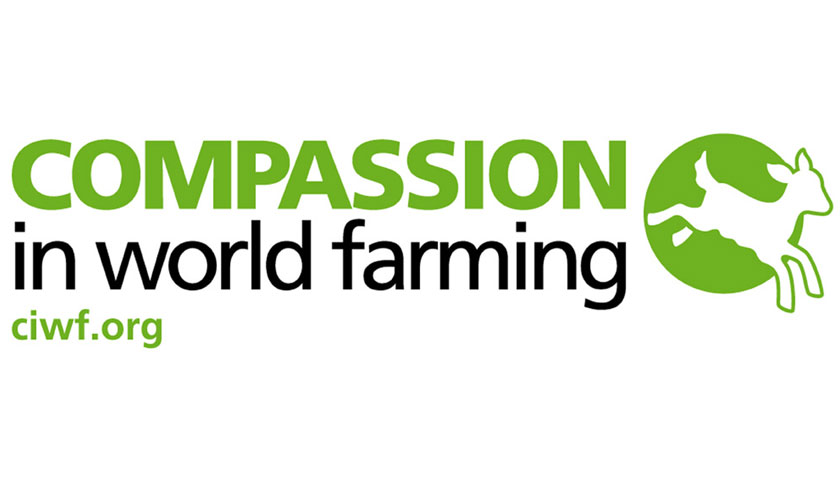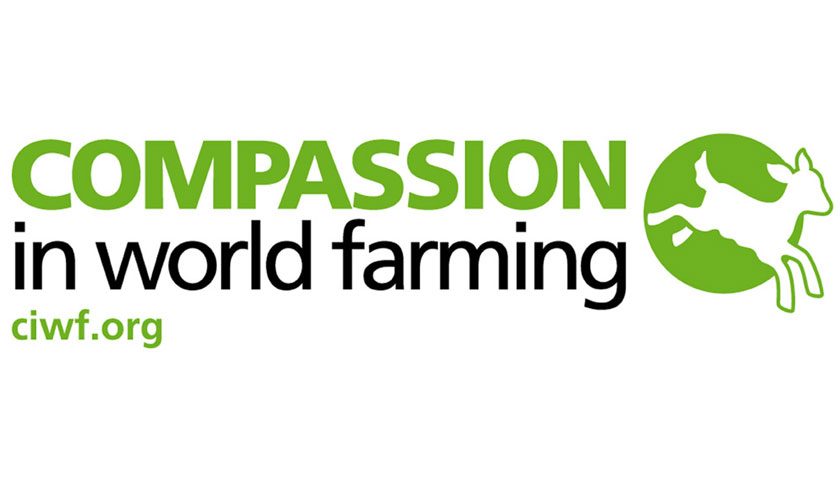The animal welfare movement is uniting and calling for a total ban on the use of cages for all farm animals across Europe. A coalition of more than 170 NGO’s, led by Compassion in World Farming, has secured well over the 1 million signatures required, for a full review, debate and vote on the issue in the European Parliament, ahead of handing in its petition in September.
In the UK, a similar petition from Compassion to generate support for ending the cage age among MPs, which includes a ban on the use of farrowing crates, has surpassed the 100k signatures required to be considered for a debate in Parliament.
One of the biggest challenges to providing a good quality of life for pigs is that the systems in which we keep them are simply not suited to their needs.
While the UK banned sow stalls in 1999 and the EU imposed a partial sow stall ban in 2013, the use of farrowing crates in indoor production is still widespread, with 60% of UK sows confined in them every year, for up to 7 days before they give birth and until their piglets are weaned at between 21 and 28 days of age.
During this period (up to a total of 5 weeks for each pregnancy, and on average twice per year), sows are confined, unable to turn around or walk more than one or two steps, let alone express more natural behaviours such as nest building and bonding with their young. This results in common signs of distress, including bar biting and mock nesting, which is why Compassion is calling for a ban on the use of farrowing crates as part of its End The Cage Age campaign.
Farrowing crates were originally designed to reduce the incidence of piglet mortality through crushing by the sow. The crate confines the sow with bars to keep her out of the piglets’ lying area and were intended to enable the sow to lie down slowly to carefully avoid crushing the piglets.
However, after years of research (both academic and commercial) free farrowing designs are now available that are capable of delivering good welfare for the sow and her piglets[1] – allowing the sow to be free from confinement whilst protecting the piglets from being crushed. Well designed and operated systems are shown to have other benefits too: the sows produce more milk as they are less stressed, so the piglets grow better and have stronger immunity. Injuries are also less likely and the need for tail docking is reduced as the pigs live in a more enriched environment and are less bored and frustrated.
For successful free farrowing, a good system design is required that matches the triangle of needs between the sow, her piglets and stock worker. Compassion produced a practical guide on free-farrowing systems some years ago, some elements of which are in use on commercial farms today.
Sows need to be trained to use free farrowing systems, ideally entering as a gilt and continuing to farrow in the same system throughout her productive life – mixing the use of free farrowing and farrowing crates has been shown to be problematic for the sow. Sows need to be calm and have a good temperament with a strong maternal ability. Over the years, selection for large litter sizes has had a negative effect on maternal ability and piglet survivability, so selection for smaller litter sizes and maternal ability are important criteria in breeding strategies for successful free farrowing.
Developing good human-animal relationships and keeping the sows calm is also essential. Appropriate training in the operation and management of a new system, and a positive attitude to adapt working practices to suit it, are key to success.
But producers need confidence to invest in these systems. Confidence that they can maintain the same or better performance; confidence they will be able to cover additional costs of production and investment in the price they receive for their pigs; confidence the retailers will support the change and not import meat from lower welfare systems; and confidence that the consumer will continue to purchase British pig meat. Everyone in the supply chain – from farm to fork – has a role to play in making change happen.
Some companies are already leading the charge. In 2017, Waitrose, Marks and Spencer and Pret were among Compassion’s Cage Free Award winners – recognised for their commitment to ending the use of cages across all their product ranges within five years, including the non-confinement of sows in farrowing crates.
Dr Tracey Jones, Compassion’s Director of Food Business says: “Change can take place at a fast rate if companies, particularly the retailers, support the move. There are an increasing number of free farrowing systems commercially available and when run well, they provide better welfare for the sow and her piglets, with more space to move and interact and more enrichment for nest building and occupation. Crucially there is growing consumer demand to see the end of the confinement of sows in farrowing crates.”
Consumers mindful of animal welfare are currently able to choose outdoor bred or reared, free range or organic pig meat, which accounts for around 40% of the UK breeding herd. However, there is no space in the ‘indoor reared’ marketing of pig meat to differentiate it between standard and better systems – so a wholescale shift is needed. Raising the baseline away from farrowing crates not only needs industry, and particularly retailer support, but will ultimately require Government backing too.
Compassion is encouraging DEFRA to not only prohibit the use of farrowing crates in UK production but for UK consumption too. The charity is asking for several amendments to the Agriculture Bill (particularly NC1 and NC4) which would ensure that any ban on the use of farrowing crates is extended to pig meat imports into the UK. Compassion is encouraging MPs from all parties to support these amendments and is also calling on the Government to provide some capital investment for farmers to help them make the necessary changes to their systems.
Dr Jones again: “Understandably, producers need the confidence to invest in better systems and we urge retailers to support a move to free farrowing for indoor systems. Some companies are already on board, but we need the whole industry to unite if we are to make free farrowing a commercial success.
“At the same time, we urge Government to make the necessary legislation and investment so that the UK can follow the example of Sweden, Norway and Switzerland where the routine use of farrowing crates has already been banned.”

